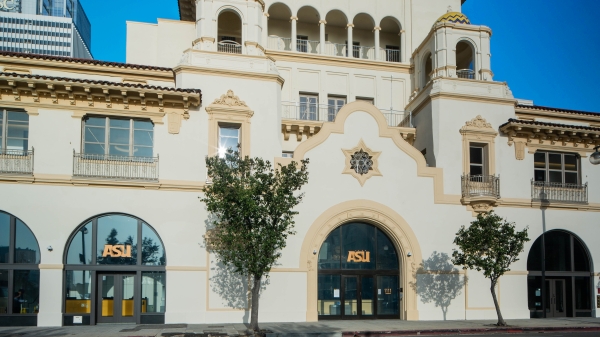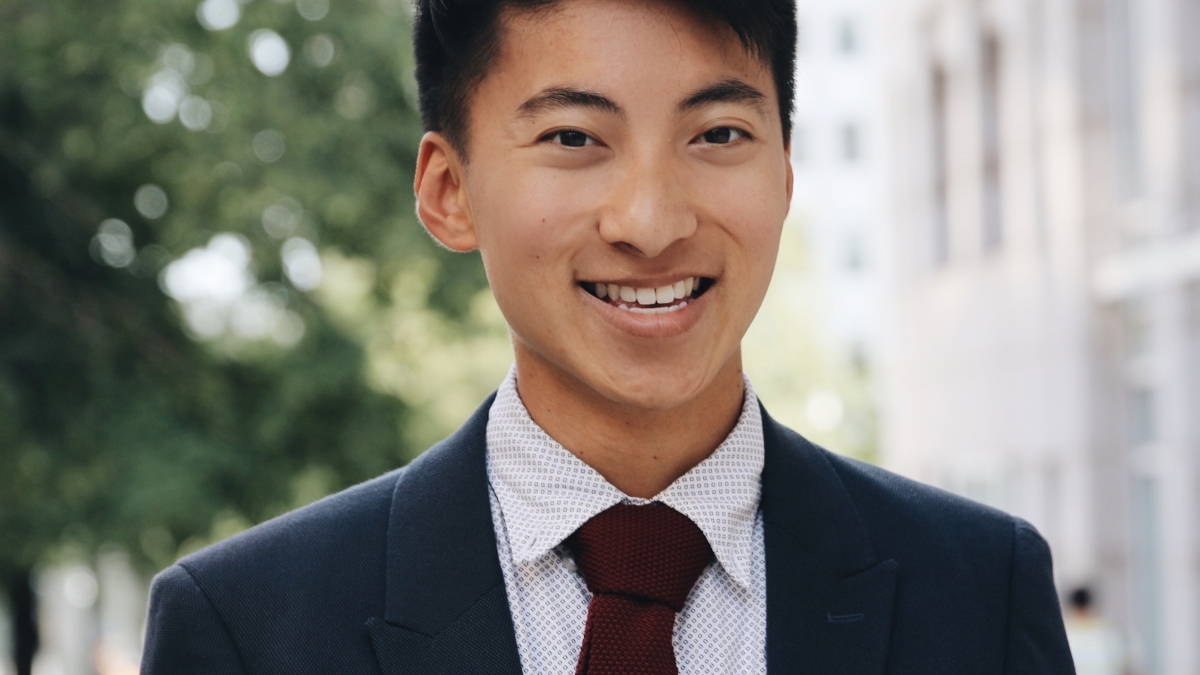Editor’s note: This is part of a series of profiles for fall 2019 commencement.
Arizona State University journalism and business major Bryan Pietsch doesn’t stay in one place for long. His career has already taken him from his hometown in Andover, Minnesota, to Washington, D.C., to intern for Reuters, to Mexico City to work on his Barrett, The Honors College thesis about freedom of the press and back to Tempe, where he graduated this week. Next, he’ll head to New York to start a fellowship with Business Insider.
In his already impressive journalism career, Pietsch spent two semesters at the Cronkite News D.C. bureau, was involved with the Delta Sigma Pi business fraternity, interned at Audacious Studios marketing agency, worked as a coordinator for Global Launch and was a reporter for the State Press and ASU Student Life.
He loved covering campus life, from basketball games to International Night to intramural sports, for ASU Student Life, which features storytelling by students, for students.
“Working as a Sun Devil storyteller was the best student job I could have asked for!” he said.
“The job brought me to places on campus that I didn't even know existed, and I got to speak with so many ASU students who I never would have met from other majors, clubs and campuses. Also, it was really cool to get credentials to take photos sitting on the court at basketball games.”
As Pietsch spent his last few days in Tempe, he reflected on his time as a Sun Devil and what he’s learned along the way.
Question: What was your “aha” moment, when you realized you wanted to study the field you majored in?
Answer: In the summer after my sophomore year, I wasn't sure what I wanted to do but was still pursuing a degree in journalism. I moved to Washington, D.C., for the summer to work in the Cronkite News Washington bureau as part of the professional program required by the Cronkite School — you can work in Phoenix, Los Angeles or D.C.
After a whirlwind summer of interviewing senators, members of Congress, reporting from the NBA draft in Brooklyn, New York, and other exciting events, I knew that journalism was the career for me. It is so rewarding to get to tell important stories like how tariffs will impact business or how immigration policy impacts real people. Also, it's a really unique career in that politicians get to know you very quickly — it's really unique to be in college and have a member of Congress or a senator know who you are.
Q: What’s something you learned while at ASU — in the classroom or otherwise — that surprised you, that changed your perspective?
A: Working in Washington definitely changed my perspective on American politics and really the country as a whole. I've worked here with the Cronkite News bureau twice and for a few months with Reuters, and being so involved in politics and being more aware of what goes on in the legislature is really eye-opening.
Q: Why did you choose ASU?
A: I spent my whole life through my senior year of high school in the same house in Minnesota, so I knew I wanted a change when I went to college. ASU offered me a scholarship that made the cost equivalent to the in-state tuition in Minnesota, so I thought I would take a chance on something new. When it came to decision day, I was actually juggling between a few options but spontaneously chose to go to ASU. I took a chance and it ended up being one of the best decisions of my life!
My best friends are from my freshman year dorm building, including my roommate, I’ve had amazing student jobs and internships, and I’ve gotten to travel and study abroad through connections I’ve made at ASU.
Q: Which professor taught you the most important lesson while at ASU?
A: One of my journalism professors, Maureen West, taught me something that I’ll take with me for the rest of my career. She always encouraged us to find at least three “voices” for a story, i.e. different people involved in the story.
She also encouraged us to talk to the “big guy” and the “little guy,” i.e. the person effecting the change and the person who will be affected by the change — how things impact real people. I think that can get lost in some news today and it’s always important to remember how policy or business decisions will impact “real people.”
Q: What’s the best piece of advice you’d give to those still in school?
A: Be comfortable with being uncomfortable. I’ve found that I grow the most and am the most successful when I’ve had to go through a situation, class or job that was uncomfortable — even if it was only for a little while.
When you take a chance and put yourself out of your comfort zone, you challenge yourself to find new ways to do things. Coming to ASU itself was a little uncomfortable, but I was able to adapt and ultimately thrive here. I studied abroad in a country where I didn’t know a single word of the language.
I got on a one-way flight to Mexico to meet friends from there who I met through one of my on-campus jobs, and it ended up being one of the most eye-opening travel experiences of my life. I went to the Cronkite D.C. bureau without even knowing if I wanted to be a journalist and adjusting to the work and life there was incredibly difficult at first, but I was able to adapt and ultimately succeed. Push yourself out of your comfort zone!
Q: What was your favorite spot on campus, whether for studying, meeting friends or just thinking about life?
A: Honestly, it was the student workroom at the Educational Outreach and Student Services building in Irish hall (where the ASU Student Life newsroom was).
It was a space for me to see my coworkers, who became my friends, to get work done, to meet and chat with my editors — the best editors ever! — and feel included and welcomed.
Q: What are your plans after graduation?
A: I’ll be moving to New York, New York, to work as a business news fellow at Business Insider.
Q: If someone gave you $40 million to solve one problem on our planet, what would you tackle?
A: I would try to tackle the plastic obsession that our world has, especially with single-use plastics. Only a small percentage of plastic gets recycled, yet think about how many plastics the average person uses in a day. I would use the money to fund affordable, sustainable alternatives to single-use plastics, and I would also use the funds to lobby for policies at the federal, state and local levels that ban single-use plastics.
More Law, journalism and politics

School of Politics and Global Studies director's new book explores mass violence
Why do people commit atrocities and why are certain groups, including religious and ethnic, more vulnerable to large-scale…

ASU faculty contributing to improvement of Wikipedia
Many academics have a love-hate relationship with Wikipedia. While the website has information about almost anything you can…

ASU Law students gain vital experience through Los Angeles location
Students at the Sandra Day O’Connor College of Law at Arizona State University may be concentrated in the school’s downtown…
